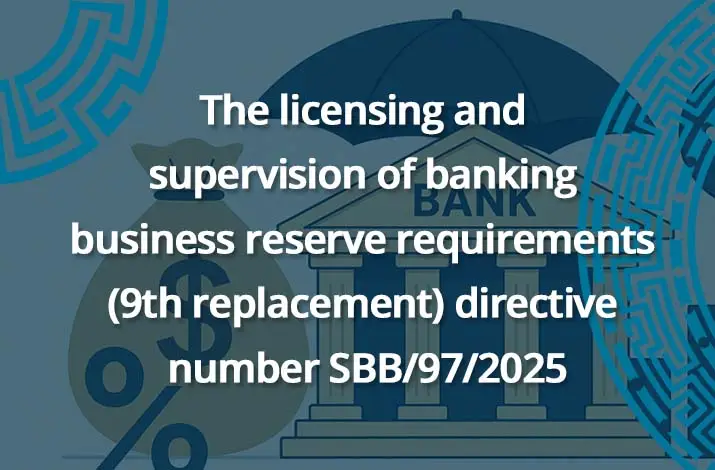The National Bank of Ethiopia issued new directives on June 25, 2025, finalizing the opening of the country’s financial sector to foreign players
Key aspects of banking licensing and renewal processes
Directive No. SBB/94/2025 provides a structured regulatory framework for banking operations in Ethiopia. The directive outlines the procedures for licensing and renewing banking businesses and representative offices. Adhering to these guidelines is crucial for maintaining the stability and integrity of the banking sector in Ethiopia.
Overview of the Directive
Legal Requirements for Banks
The directive outlines the legal requirements that banks and representative offices must comply with within the regulatory framework.
Regulatory Compliance
It ensures that banks operate within established regulations, promoting accountability and transparency in the banking sector.
Public Confidence
The directive aims to enhance public confidence in the banking system by ensuring that institutions operate in an ethical and transparent manner.
Purpose and Scope
Clear Licensing Guidelines
The directive establishes clear guidelines for the licensing process of banking institutions, ensuring regulatory compliance.
Renewal of Banking Institutions
The directive outlines the procedures for the renewal of licenses for banking institutions and representative offices.
Applicability to Financial Entities
This directive applies to all financial entities intending to operate within Ethiopia, ensuring a standardised framework
Key Definitions and Terms
Banking Business
Understanding the term ‘banking business’ is crucial for comprehending its regulations and operations within the financial sector.
Representative Office
A ‘representative office’ serves as a branch for a foreign bank, facilitating business operations without full banking capabilities.
License
The term ‘license’ refers to the official permission granted to banks and financial institutions to operate legally.
Licensing Requirements for Banking Business
Eligibility Criteria for Applicants
Financial Capacity
Applicants must demonstrate sufficient financial resources to ensure stability and sustainability in the banking sector.
Relevant Experience
Experience in the banking or financial services sector is crucial for applicants to ensure effective operations and management.
Integrity Standards
Applicants must adhere to high integrity standards to promote trust and ethics within the banking industry.
Documentation and Application Process
Comprehensive Documentation
A thorough application requires comprehensive documentation to ensure all required information is provided.
Financial Statements
Financial statements must be included to demonstrate the organization’s financial health and compliance
Business Plans
A well-structured business plan is essential to outline the objectives and strategies of the organization.
Approval and Issuance of Licenses
Application Review Process
The regulatory authority conducts a thorough review of the application to ensure compliance with requirements.
Issuance of License
If all requirements are met, a license will be issued to the institution, allowing it to operate.
Ensuring Capability
The approval process ensures only capable institutions receive banking licenses to maintain industry standards.
Renewal of Banking Business Licenses
Renewal Application Requirements
Updated Financial Information
Institutions must submit current financial statements reflecting their financial health to renew their banking license.
Regulatory Compliance
Ongoing compliance with regulatory requirements is crucial for the renewal of a banking license, ensuring adherence to laws.
Compliance and Performance Review
Regulatory Reviews
Regulatory authorities perform periodic reviews to ensure banks meet compliance standards and operational integrity.
Performance Assessment
Performance assessments evaluate operational metrics before approving renewal applications for banking institutions.
Operational Integrity
Maintaining operational integrity is crucial for banks to gain trust and ensure stable financial practices.
Renewal Timelines and Fees
Importance of Timelines
Understanding submission timelines is essential for banks to ensure uninterrupted business operations and compliance with regulations.
Applicable Fees
Banks must be aware of the fees associated with renewal applications to budget accordingly and avoid penalties.
Business Operations Continuity
Timely applications and fee payments are crucial for maintaining operational continuity in banking, avoiding service interruptions.
Establishment of Representative Offices
Eligibility and Application Process
Eligibility Criteria
Applicants must meet specific criteria to qualify for establishing a representative office, ensuring compliance with regulations.
Detailed Application Submission
A comprehensive application must be submitted, detailing the intended scope of activities of the representative office.
Operating Conditions and Limitations
Defined Operating Conditions
Representative offices must adhere to specific operating conditions to ensure regulatory compliance and effective functioning.
Restrictions on Banking Activities
Certain banking activities may be restricted, necessitating a thorough understanding of these limitations for compliance.
Importance of Compliance
Understanding these limitations is crucial for ensuring compliance and avoiding potential penalties or legal issues.
Reporting and Compliance Obligations
Regulatory Reporting Obligations
Representative offices must fulfil specific reporting requirements to maintain compliance with regulatory bodies.
Transparency and Compliance
Ensuring transparency through adherence to established guidelines is essential for representative offices.
Regulatory Oversight and Inspections
Importance of Inspections
Regular inspections are crucial for ensuring compliance with industry regulations and guidelines in the banking sector.
Regulatory Authorities’ Role
Regulatory authorities oversee the banking sector to maintain integrity and protect consumers through consistent inspections and audits.
Maintaining Integrity
The integrity of the banking sector is maintained through diligent oversight and adherence to regulatory measures and standards.
Penalties for Non-Compliance
Consequences of Non-Compliance
Non-compliance can lead to severe consequences such as hefty fines and other legal repercussions for institutions.
License Revocation
Institutions may face revocation of licenses as a penalty for failing to adhere to regulations and directives.
Understanding Regulations
Institutions must comprehend the regulations to avoid non-compliance and its associated penalties.
Appeals and Dispute Resolution
Right to Appeal
Institutions are granted the right to appeal against regulatory decisions, ensuring their interests are protected.
Dispute Resolution Procedures
The directive provides a clear outline of the procedures for dispute resolution, promoting efficiency and fairness.
Fairness and Transparency
Ensuring fairness and transparency in dispute resolution is crucial for maintaining trust in the regulatory process.










